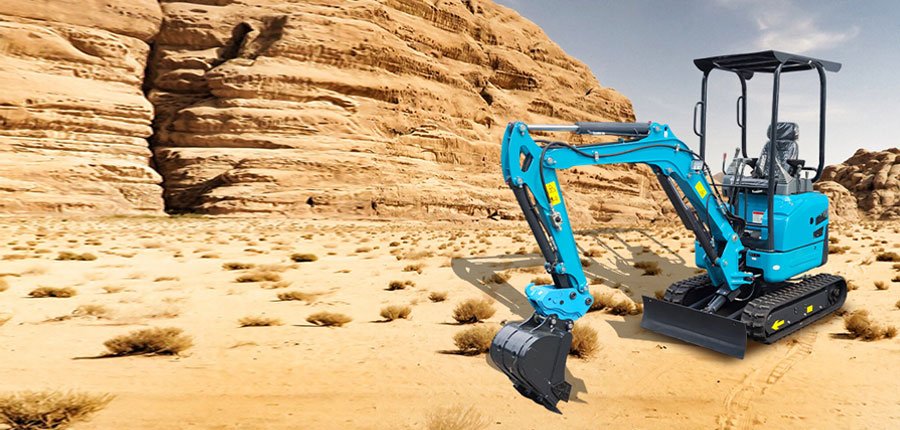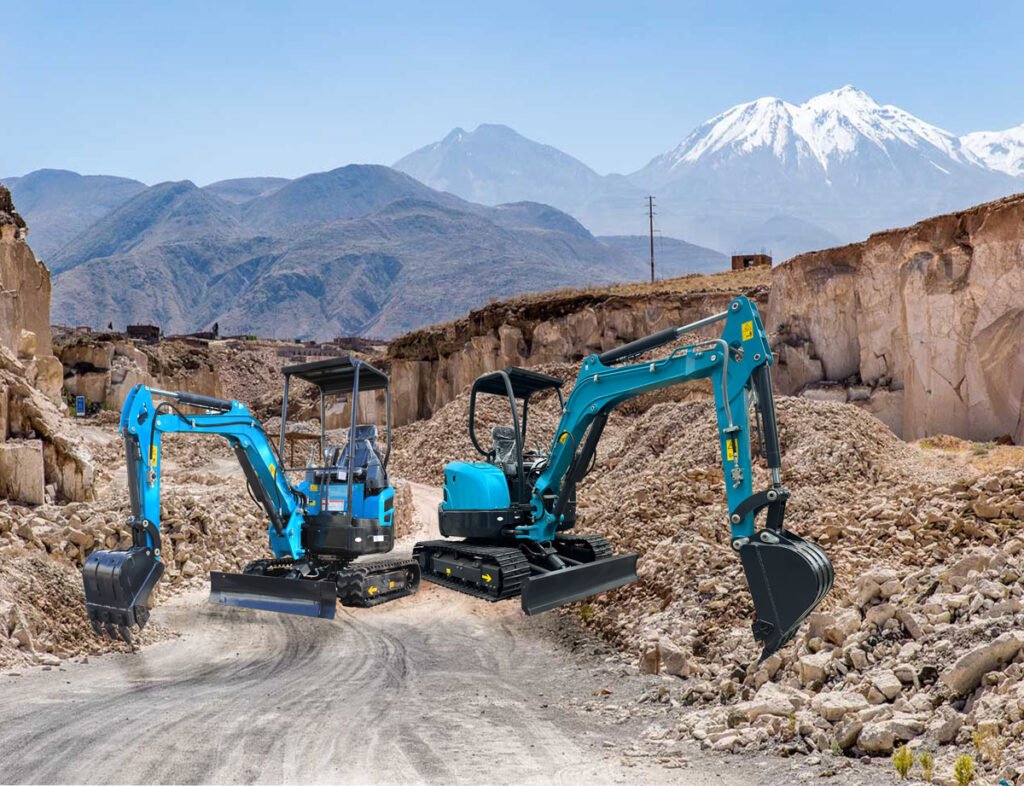Excavator Price:Excavators are powerful machines widely used in the construction industry for digging, trenching, and earthmoving tasks. If you’re in the market for an excavator, it’s essential to understand the factors that influence their pricing. In this article, we will explore the various types of excavators, factors affecting their prices, the price range for different sizes, and provide useful tips for buying the right excavator for your needs.
What is an Excavator?

An excavator, also known as a digger or mechanical shovel, is a heavy-duty construction machine used to dig, scoop, and lift materials. It consists of a boom, stick, and bucket attached to a rotating platform called the house. Excavators are commonly used in construction, mining, landscaping, and demolition projects due to their versatility and efficiency.
Types of Excavators
Excavators come in different types, each designed for specific tasks and working conditions. Let’s take a closer look at some common types of excavators:
Mini Excavators
Mini excavators, also known as compact excavators, are lightweight machines ideal for small-scale projects. They typically weigh between 1 and 10 tons and offer excellent maneuverability in tight spaces. Mini excavators are commonly used in landscaping, residential construction, and utility work.
Crawler Excavators
Crawler excavators, also called track excavators, are robust machines designed for stability and mobility on rough terrains. They feature tracks instead of wheels, providing better traction and weight distribution. Crawler excavators are suitable for heavy-duty digging and construction projects.
Wheeled Excavators
Wheeled excavators are similar to crawler excavators but feature wheels instead of tracks. This design makes them more suitable for projects that require frequent relocation. Wheeled excavators are often used in road construction, urban development, and utility maintenance.
Long Reach Excavators
Long reach excavators have an extended boom and arm, allowing them to reach greater depths or heights. They are commonly used for dredging, deep excavation, and demolition projects. The long reach capability of these excavators makes them invaluable in situations where standard excavators cannot access the desired areas.
Backhoe Loaders
Backhoe loaders combine the capabilities of a backhoe and a loader into a single machine. They feature a digging bucket on the back and a loader bucket on the front. Backhoe loaders are versatile machines used in construction, landscaping, and agricultural projects.
Factors Affecting Excavator Price
Excavator Price:Several factors influence the price of an excavator. Understanding these factors can help you make an informed decision when purchasing one. The following are the key factors affecting excavator prices:
Size and Capacity
The size and capacity of an excavator play a significant role in determining its price. Generally, larger excavators with higher lifting capacities command higher prices. The size of the machine also affects its mobility and maneuverability, which can impact the overall cost.
Brand and Manufacturer
The brand and manufacturer of an excavator can influence its price. Established and reputable brands often come with a higher price tag due to their reliability, performance, and after-sales support. Lesser-known or newer brands may offer more affordable options, but it’s important to consider their reputation and customer reviews.
Attachments and Additional Features
Excavator prices can vary depending on the attachments and additional features included. Common attachments include buckets, breakers, grapples, and thumbs. Excavators with advanced features like GPS technology or telematics systems may have a higher price but can enhance productivity and efficiency.
Condition and Age
The condition and age of an excavator can significantly impact its price. Brand-new excavators will generally have a higher price compared to used ones. However, used excavators in good condition can offer substantial cost savings while still delivering reliable performance. It’s important to carefully inspect and evaluate the condition of a used excavator before purchasing.
Excavator Price Range

Excavator Price:Excavators are available in different sizes, and their prices can vary accordingly. Here’s an overview of the price ranges for small, medium, and large excavators:
Small Excavators (1-10 tons)
Small excavators typically range in price from $20,000 to $70,000. These compact machines are suitable for small-scale projects and offer excellent maneuverability in tight spaces. The price can vary based on the brand, size, attachments, and condition of the excavator.
Medium Excavators (10-20 tons)
Medium-sized excavators have a price range of $70,000 to $150,000. They offer a balance between power and versatility, making them suitable for a wide range of construction tasks. The price can vary depending on factors such as brand, features, attachments, and age of the excavator.
Large Excavators (20+ tons)
Large excavators, designed for heavy-duty projects, have a price range of $150,000 to several hundred thousand dollars. These robust machines offer exceptional digging power and lifting capacity. The price can vary significantly based on the brand, size, attachments, and overall condition of the excavator.
Tips for Buying an Excavator
Purchasing an excavator is a significant investment, and it’s crucial to make the right choice. Consider the following tips when buying an excavator:
Determine Your Needs
Evaluate the specific requirements of your projects to determine the appropriate size and type of excavator. Consider the tasks you frequently perform and the working conditions you encounter. This will help you narrow down your options and select the most suitable excavator for your needs.
Research Different Brands and Models
Thoroughly research different excavator brands and models to compare their features, performance, and reliability. Read customer reviews and seek recommendations from industry professionals. Look for brands with a reputation for producing high-quality and durable machines.
Consider Buying Used Equipment
If you’re on a tight budget or need a temporary solution, buying a used excavator can be a viable option. However, it’s essential to inspect the machine thoroughly and consider its maintenance and repair history. Consult with a qualified mechanic or equipment expert to assess the condition and ensure you’re making a sound investment.
Evaluate Maintenance and Operating Costs
Factor in the maintenance and operating costs associated with owning an excavator. Consider the availability and cost of spare parts, fuel consumption, and regular servicing requirements. Opting for a more fuel-efficient and reliable model can save you money in the long run.
Seek Professional Advice
If you’re new to purchasing excavators or unsure about the right choice, seek advice from professionals in the industry. Consult with equipment dealers, experienced operators, or construction consultants who can provide valuable insights and guidance based on their expertise.
Conclusion
When considering an excavator purchase, understanding the factors affecting excavator prices is crucial. The size and capacity, brand and manufacturer, attachments and additional features, as well as the condition and age of the excavator, all play a significant role in determining its price. By carefully assessing your needs, researching different models, and considering used options, you can make an informed decision and find the right excavator to meet your construction requirements.
FAQs
- What is the average cost of a small excavator?
- Excavator Price:The average cost of a small excavator ranges from $20,000 to $70,000, depending on factors such as size, brand, attachments, and condition.
- Which excavator brand offers the best value for money?
- Excavator Price:Several excavator brands offer excellent value for money, including Caterpillar, Komatsu, Volvo, and Hitachi. It’s essential to research and compare different models to find the one that suits your needs and budget.
- Can I rent an excavator instead of buying one?
- Yes, renting an excavator is a viable option, especially for short-term or occasional projects. Rental costs vary based on the size and duration of the rental.
- How long do excavators typically last?
- Excavator Price:With proper maintenance and care, excavators can last for several thousand hours of operation. The lifespan can vary depending on usage, maintenance practices, and the quality of the machine.
- Are there any financing options available for purchasing an excavator?
- Yes, many equipment manufacturers and dealers offer financing options for purchasing excavators. These options may include lease agreements or equipment loans with flexible payment terms.




